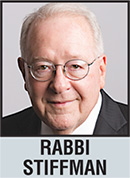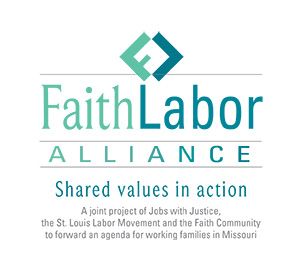 By RABBI JEFFREY STIFFMAN
By RABBI JEFFREY STIFFMAN
Passover (April 8-16) celebrates the redemption of the Hebrew slaves from Pharaoh’s cruelty. It is the most celebrated holiday in the Jewish year.
The Passover Seder meal is designed to help the children understand that we still consider ourselves as liberated slaves and must fight for freedom from economic slavery and the dignity of the workplace.
 In the last presidential election, over 80 percent of American Jews voted for the Democratic presidential candidate. Jews overwhelmingly vote for pro-Labor candidates.
In the last presidential election, over 80 percent of American Jews voted for the Democratic presidential candidate. Jews overwhelmingly vote for pro-Labor candidates.
JEWISH/LABOR CONNECTION
Is there a connection between the two?
Some say that Jewish concern for the downtrodden is inherited through mother’s milk. A more realistic view is that Jews are reminded every day about our past.
On Sabbaths and Holy Days, we say the blessing over the wine which includes the words, “This is a reminder of the Exodus from Egypt.” The “Song of the Sea” sung in the Bible by the children of Israel after crossing the Red Sea is part of our daily prayers and Sabbath worship.
There is a connection between voting patterns and Passover. And there is one more that is of special interest to us. Jews have been deeply involved in Labor union creation and organizing since the late 1800s.
Millions of Jews came to America between the 1850s and 1924, when anti-immigrant laws were passed to keep them out.
FOUNDER OF AFL
One of these was Samuel Gompers, whose family immigrated from Holland. He was a cigar maker by trade.
He joined the Cigar Makers Union as a young man and rose through the ranks. In 1886, he was one of the founders of the AF of L (American Federation of Labor), which led the fight for the eight-hour workday. At that time, it numbered 50,000 members. He served as president off and on for 37 years.
When he retired in 1924, the AF of L numbered over three million members. He was one of many Jews who played an important part in organizing many trades.
SUPPORT FOR ALL
Jews stood by their partner Labor leaders of all religious and ethnic groups. The unions welcomed all who wished for fairness and decent wages. Although some trades – such as the garment industry – attracted large numbers of Jewish immigrants, the unions that represented them were made up of many different types of Americans.
Many Jewish immigrants became workers in the garment industry sweatshops – alongside Irish and Italian co-workers. They participated in the great uprising of 1909-1910 to protest the terrible working conditions. Twenty thousand workers struck during a freezing winter, and the union finally won its case.
The arbitrator between management and the unions was attorney Louis Brandeis, later to become the first Jewish Justice of the Supreme Court.
JEWS LOYAL UNION MEMBERS
Throughout the history of the American Labor Movement, Jews have been loyal rank-and-file members and leaders.
I believe that we must see a direct connection between the ancient fight for freedom and the present struggle for the dignity of work and the workplace.
(Rabbi Stiffman is Rabbi Emeritus of Congregation Shaare Emeth where he served for 53 years.)

